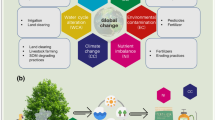Abstract
There are two competing approaches to sustainability in agriculture. One stresses a strict economic approach in which market forces should guide the activities of agricultural producers. The other advocates the need to balance economic with environmental and social objectives, even to the point of reducing profitability. The writings of the eighteenth century moral philosopher Adam Smith could bridge the debate. Smith certainly promoted profit-seeking, private property, and free market exchange consistent with the strict economic perspective. However, his writings are also consistent with many aspects of sustainable agriculture. For example, Smith argued that people ought to exercise restraint in their pursuit of self-interest, and he believed in balancing economic with environmental and social considerations. If both sides of the debate more fully regard the work of Adam Smith, then proponents of the strict economic perspective might be more appreciative of the concerns raised within the sustainable agriculture community, while advocates of sustainability might be more effective in achieving the objective of a sustainable agriculture.
Similar content being viewed by others
References
Allen P., M. Kovach (2000). The capitalist composition of organic: The potential of markets in fulfilling the promise of organic agriculture. Agriculture and Human Values 17: 221–232
Allen P., C. Sachs (1993). Sustainable agriculture in the United States: Engagements, silences, and possibilities for transformation. In: P. Allen (ed) Food for the Future: Conditions and Contradictions of Sustainability. New York: Wiley, pp. 139–167
Allen P., D. Van Dusen, J. Lundy, S. Gliesmann (1991). Integrating social, environmental, and economic issues in sustainable agriculture. American Journal of Alternative Agriculture 6(1): 34–39
Beckerman W. (2002). Poverty of Reason: Sustainable Development and Economic Growth. Oakland, California: Independent Institute
Berry W. (1986). The Unsettling of America: Culture and Agriculture. San Francisco, California: Sierra Club Books
Bromley D. W. (2005). The poverty of sustainability: Rescuing economics from platitudes. Agricultural Economics 32(1): 201–210
Douglass G. K. (1984). The meanings of agricultural sustainability. In: G. K. Douglass (ed.) Agricultural Sustainability in a Changing World Order. Boulder, Colorado: Westview Press, pp. 3–29
Ekelund R. B. Jr., R. F. Hebert (1990). A History of Economic Theory and Method. New York: McGraw-Hill Publishing Company
Evansky J. (1993). Retrospectives: Ethics and the invisible hand. Journal of Economic Perspectives 7(2): 197–205
Francis C., G. Youngberg (1990). Sustainable agriculture: An overview. In: C. A. Francis, C. B. Flora, L. D. King (eds) Sustainable Agriculture in Temperate Zones. New York: Wiley, pp. 1–12
Friedman, M. (1970). “The social responsibility of business is to increase its profits.” New York Times Magazine September 13: 32–33, 122–126
Gold, M. V. (1999). Sustainable Agriculture: Definitions and Terms. Special Reference Briefs Series SRB 99-02, September. Agricultural Research Service, US Department of Agriculture
Haynes R. P. (1991). Science, technology, and the farm crisis. In: C. V. Blatz (ed.) Ethics and Agriculture: An Anthology on Current Issues in World Context. Moscow: University of Idaho Press, pp. 121–129
Ikerd J. E. (1990). Agriculture’s search for a sustainability and profitability. Journal of Soil and Water Conservation 45(1): 18
James H. S. Jr., F. Rassekh (2000). Smith, Friedman, and self-interest in ethical society. Business Ethics Quarterly 10(3): 659–674
Johnson D. G. (1997). Agriculture and the wealth of nations. American Economic Review 87(2): 1–12
Jones M. J. (1993). “Sustainable agriculture: An explanation of a concept.” In: D. J. Chadwick, J. Marsh (eds.), Crop Protection and Sustainable Agriculture (pp. 30–38). Ciba Foundation Symposium 177. New York, New York: Wiley
Leopold A. (1949). Sand County Almanac. New York: Oxford University Press
McIsaac G. (1994). Sustainability and sustainable agriculture: Conceptual evolution, competing paradigms, and possible consensus. In: G. McIsaac, W. R. Edwards (eds.) Sustainable Agriculture in the American Midwest: Lessons from the Past, Prospects for the Future. Chicago: University of Illinois Press, pp. 9–34
Murray, A. (2005). “Will ‘social responsibility’ harm business?” Wall Street Journal, Wednesday, May 18: A2
Smith A. (1759/1982). The Theory of Moral Sentiments. Indianapolis, Indiana: Liberty Classics
Smith A. (1776/1981). An Inquiry into the Nature and Causes of the Wealth of Nations. Indianapolis, Indiana: Liberty Classics
Thompson P. B. (1997). Sustainability as a norm. Society for Philosophy and Technology Journal 2(2): 75–94
Thompson P. B. (1998). Agricultural Ethics: Research, Teaching, and Public Policy. Ames: Iowa State University Press
United States Department of Agriculture (USDA) (2005). “Exploring sustainability in agriculture.” Sustainable Agriculture Research and Education. US Department of Agriculture. Accessed on July 5, 2005 at http://www.sare.org/publications/explore/explore.pdf
Van Calker K. J., P. B. M. Berentsen, G. W. J. Giesen, R. B. M. Huirne (2005). Identifying and ranking attributes that determine sustainability in Dutch dairy farming. Agriculture and Human Values 22(1): 53–63
World Commission on Environment, Development (1987). Our Common Future. New York: Oxford University Press
Acknowledgments
I appreciate helpful comments by Farhad Rassekh and two anonymous referees. This project was supported in part by the Missouri Agricultural Experiment Station.
Author information
Authors and Affiliations
Corresponding author
Additional information
Harvey S. James Jr., PhD is an Associate Professor in the Division of Applied Social Sciences at the University of Missouri-Columbia. His research interests are in the economic determinants of trust and ethical behavior. He recently completed studies on trust in biotechnology institutions and the ethical attitudes of farmers.
Rights and permissions
About this article
Cite this article
James, H.S. Sustainable agriculture and free market economics: Finding common ground in Adam Smith. Agric Hum Values 23, 427–438 (2006). https://doi.org/10.1007/s10460-006-9020-6
Accepted:
Published:
Issue Date:
DOI: https://doi.org/10.1007/s10460-006-9020-6




